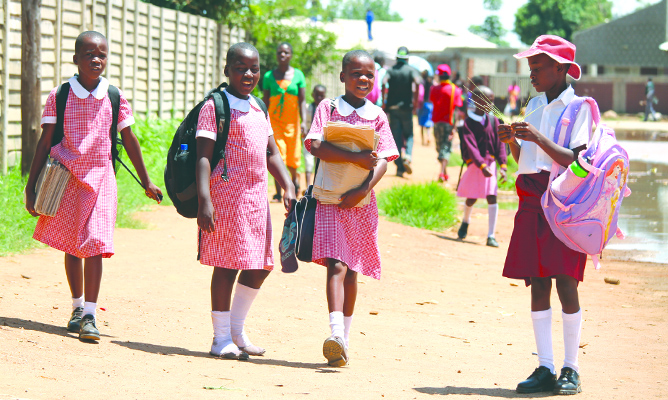
Today is International Day of the Girl Child. As I write, my spirits are high. I am reminiscing on my old days when I was a girl. It’s so easy to get into the frame of being a girl now because these were the days that shaped the woman that I am today, and I think every sister says Amen!
Nyaradzo Mashayamombe
Actually, I am not saying a girl’s life remains the same several years later; she evolves, she changes, sometimes for the better and sometimes for the worst — depending on what life has thrown at her. Some women remember their days when they were girls as awesome, meaning life may have been very kind to them during this period, while others may remember the horrific elements of that time. For others like me, it’s a mix of the two, the good and the bad.
The good because I was blessed and I am still blessed with a mother who went to the moon and back for her eight children as a widow at the age of 36 and saw to it that her children had a bright future, fighting with everything she had for our education.
She made sure we appreciated life by making small privileges like having bread once a month because she would have travelled to the city to get the little pension my late father had worked for. It was a tough life because we used to travel more than 10 km a day to school.
The beauty of such moments though, are that they built resilience in me and I am sure in every person who went through the same. You would go through such life with either a defeated mindset or an empowered one. If defeated, some may fail to rise beyond these challenges, but if empowered, you thrive so that you come out of this hard life. At that point you would have so much imaginations of what town life looked like, often from novels that you would have stumbled upon, or a television you once came across.
On December 19 2011, the United Nations General Assembly adopted Resolution 66/170 to declare October 11 as the International Day of the Girl Child, to recognise girls’ rights and the unique challenges girls face around the world. The first commemorations were in New York on October 11 2012. I remember the moment vividly as I travelled all the way from Oregon in Grants Pass in the United States where I was based, to go to New York for this day. It was powerful and the commemorations were electric. We met with international organisations like Girls Not Brides as we shared a similar passion concerning the girl child. The United Nations secretary-general Ban Ki-Moon was present and he gave a moving speech about the issues of girls on this day. How awesome of the globe to finally come to terms with this truth!!
This year’s international theme is, The Power of the Adolescent Girl: Vision for 2030 and our Zimbabwe theme is, Unlocking the Power of Girls. But what is the “power” of girls? Do girls have power? Or is it hidden somewhere where we should “unlock it”? If so, who should unlock it for them?
- Chamisa under fire over US$120K donation
- Mavhunga puts DeMbare into Chibuku quarterfinals
- Pension funds bet on Cabora Bassa oilfields
- Councils defy govt fire tender directive
Keep Reading
With the coming of the sustainable development goals, we see that we can fit girls in each and every one of them. The question is, we have these awesome themes every year; we have these moving speeches from leaders. This year, First Lady Grace Mugabe launched the African Union’s campaign to end child marriages. Do these give the girl child or the adolescent her power? Do they change her life and unlock her potential?
Real change will come when girls’ issues are seriously invested in. When real resources and money is allocated and investments are made into girls’ education and protection. Unlocking the power in girls simply means sending her to school. Give her real quality education. Ensure a safe environment where she can learn and develop without hindrances. Girls that are married off early reach primary school and drop out. The globe during the Millennium Development Goals era agreed to measure literacy as one of successes in education.
The question is, how useful is it for a girl or child to obtain Grade 7 education? Will it help them transform their life? What will help and protect girls is obtaining a basic high school certificate or diploma because then, it also protects them. This is true for bright and not-so-bright children. The more time they spend in school; the more they develop as individuals mentally and physically. They are also protected from early marriages and having children spend more time in school contributes to the demographic dividend of a country.
As I conclude, the unique challenges facing adolescent girls in this country specifically is the lack of quality education. A number of girls drop out after writing their grade seven exams. Many go to towns to begin working as house maids and they get abused in the process. Another challenge right now is the issue of poverty and orphanhood that has left a lot of girls and young people vulnerable as they are having to exchange their bodies for sex in order to survive. The law should also work in protecting girls from abuse. The prevailing economic conditions have exposed girls and young women to untold suffering as their issues are being placed as secondary in priority and this is visible in the allocation of the resources in the national budget to their issues. Real protection of girls begins with allocating funding to their issues in the national budget!
Nyaradzo “Nyari” Mashayamombe is the founder & executive director of Tag a Life International Trust (TaLI), a girl child rights organisation. She is a development consultant, entrepreneur and singer. Contact her on e-mail: nyarimash7@gmail.com










